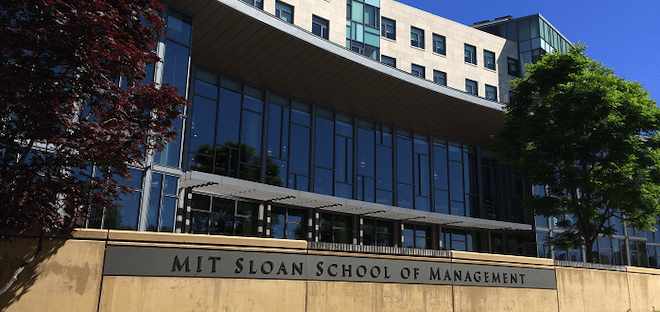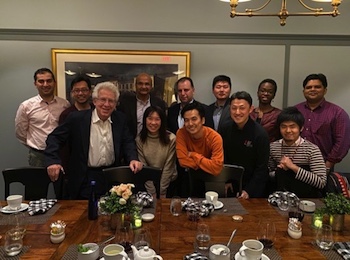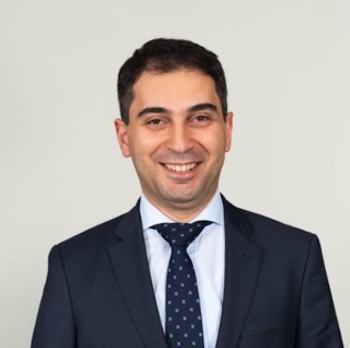
MIT Sloan
Nikolay Georgiev was thrilled to learn of his acceptance to the MIT Sloan Fellows MBA program. It was unexpected for a few reasons. The first was that he was in his mid-30s, older than most admits to the prestigious program.
But the main thing was that he didn’t even have a business background.
“I thought they normally recruit much younger students,” Georgiev, now 38, says, “and I didn’t really think I had a chance of getting in since I had an electrical engineering and computer science undergrad training.”
What likely helped him gain admission to one of the most exclusive executive MBA programs in the world: a diverse and fascinating background. A first-generation student born in Bulgaria — no hotbed of MBA talent under normal circumstances — Georgiev entered the academic world to become an electrical engineer, earning a bachelor’s in engineering from the Technical University of Gabrova in that Eastern European country before moving to the United States to do work-study in Michigan. That’s where he got his first practical management training — running a fine dining restaurant — and where he realized he wanted to enter the world of finance and business.
Georgiev relocated to the UK to attend a 12-month program, earning a management/finance degree at the University of Leicester. From there he landed a job with Hinkley Point C Nuclear Project in London managing $22 billion in supply chain contracts. But after six years — and fueled to continuously work hard to set an example for his young daughter — Georgiev attended a short-term summer executive investment management program at Harvard in 2018. And that proved to be a fateful decision.
A FORTUITOUS MEETING

Nikolay Georgiev (far left) and other MIT Sloan Fellows at a dinner with Bob Pozen, former president of Fidelity Investment (third from left) in 2019. Courtesy photo
One afternoon near the end of his program at Harvard, Georgiev had free time between classes on campus. He didn’t use the time to relax or eat lunch but instead to take a short walk to MIT’s campus to check out even more options for schooling. There he had what he calls a “casual conversation” with faculty at the business administrative office. They kindly invited him to attend a dinner with MIT faculty at an Italian restaurant in London that was only a short walk from his European workplace.
The most enticing part of the invitation for Georgiev: the opportunity to meet with the dean of MIT Sloan to learn more about the Sloan Fellows MBA program.
By coincidence, or fate, the dinner lined up perfectly with the conclusion of Georgiev’s summer program at Harvard. He would be flying back home to the UK from his summer program in Massachusetts just after attending, going back to working 13- to 14-hour days. Suddenly the idea of attending business school was even more practical and enticing.
Georgiev attended the dinner, where he was engrossed in hours of conversation with Jake Cohen, associate dean of MIT Sloan, and other faculty. Shortly after dinner he made the decision to apply to the 12-month Sloan Fellows MBA.
He had considered executive programs at Stanford Graduate School of Business and London Business School as well, but ultimately decided to dedicate his time and effort to his MIT Sloan Fellows MBA application.
‘VERY RELAXED AND VERY, VERY RIGOROUS’

Nikolay Georgiev
The Sloan Fellows MBA is full-time residential program that begins with a summer “bootcamp” where the cohort is split into working teams. In September, each new Sloan Fellows cohort merges with students from MIT’s two other MBA programs, the full-time two-year program and the 20-month executive MBA.
What sets the Sloan Fellows apart: exclusivity. Students must have at least 10 years of full-time experience; most who apply are professionals on a fast track to senior leadership positions.
Nikolay Georgiev applied to be a Sloan Fellow in January 2019 and was accepted to the program a month later. He was part of a diverse international cohort of around 110 students.
A unique benefit to attending the Sloan Fellows MBA is the opportunity to cross-register at Harvard for free, with very little red tape. Georgiev didn’t hesitate to take full advantage of this during his time at MIT and enrolled in a multitude of courses. He loved that students were encouraged to take electives and collaborate with others in the Engineering and Finance departments.
Likewise, Georgiev describes the culture in the MIT Sloan Fellows program to be “very relaxed, and very very rigorous. It is down to earth as everyone is very approachable and helpful — from professors to program office to students to alumni but you must work very hard.”
Georgiev was initially attracted to MIT for a few reasons; culture, reputation, and because he was familiar with the school because of its relationship and proximity to Harvard. He also loved that professors and faculty encouraged students to take risks, to step outside of their comfort zones. “There is a strong culture of entrepreneurship at MIT,” he says. That culture would prove crucial to the post-graduation launch of his own business.
ON TO NEW FRONTIERS
Coronavirus hit in March 2020 as Georgiev’s Sloan Fellows journey was winding down. He says faculty strongly supported students during the initial lockdown, loaning students various technologies and study supplies as needed. Wrapping up the end of his degree from home wasn’t too challenging because he only had to make the transition for a few months.
Georgiev earned his degree in late May 2020 and returned to London. Soon after he co-founded Chelo, a fintech startup that uses AI to create personalized recommendations for users and learns from a user’s experience and choices. Chelo promises to “revolutionize the way SMEs raise alternative capital through clustering machine learning.” The app is still developing, he says, and there are similar apps in existence, but Chelo would use more advanced forms of technology than those currently available.
Georgiev attributes his success to having a long-term vision and a great support system, taking calculated risks, and being flexible when a new opportunity comes his way. “With these ingredients,” he says, “any prospective student is in a position to succeed.”
DON’T MISS AFTER MIT SLOAN STUDENTS CAUGHT PARTYING, SCHOOL MOVES ALL INSTRUCTION ONLINE and MBA DISRUPTED: AN MIT SLOAN FELLOW’S INSIGHTS ON A MOST UNUSUAL YEAR





Questions about this article? Email us or leave a comment below.